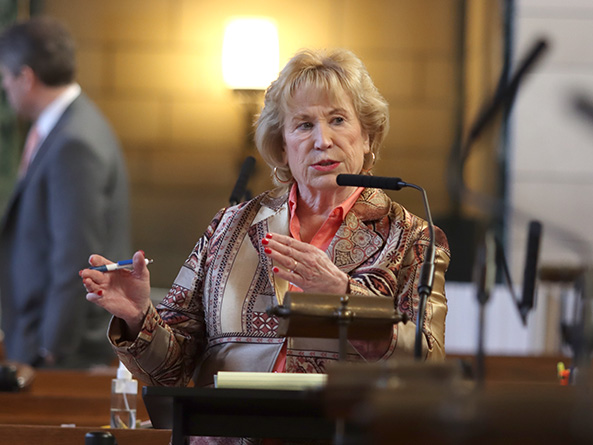Proposal to cut income tax rates advances after cloture vote
Lawmakers gave first-round approval Feb. 24 to a bill that would cut Nebraska’s top individual income tax rate after amending it to include a proposed reduction in the top corporate income tax rate.
LB939, introduced by Elkhorn Sen. Lou Ann Linehan, would cut Nebraska’s top individual income tax rate in three steps, from the current 6.84 percent to 5.84 percent by tax year 2025.
The rate applies to taxable income of $29,000 and over for individuals and $58,000 and over for those who are married filing jointly.
Linehan said the proposal would help the state attract workers and businesses and provide a tax cut to middle class Nebraskans at a time when the state is collecting hundreds of millions of dollars more in revenue than is necessary to fund its operations.
“When we are collecting too much money from people, we need to send it back to the people,” she said.
The state Department of Revenue estimates that LB939 would reduce general fund revenue by $61.7 million in fiscal year 2022-23 and $176.5 million in FY2023-24. By FY2026-27, the reduction would grow to $363.4 million.
Linehan said lawmakers may have to adjust LB939 on select file to account for updated revenue projections and the Appropriations Committee’s proposed budget.
A Revenue Committee amendment, adopted 39-2, added the provisions of LB938, also introduced by Linehan. That measure would incrementally cut the state’s top corporate income tax rate, which applies to taxable income in excess of $100,000, from the current 7.5 percent to 5.84 percent by tax year 2026.
The amendment would continue the phased-in reduction of the top corporate rate approved by the Legislature last year, Linehan said.
The department estimates that the corporate rate cut would reduce general fund revenue by $1.9 million in fiscal year 2022-23, $10.6 million in FY2023-24, $29.3 million in FY2024-25 and $53.5 million in FY2025-26.
Speaker Mike Hilgers of Lincoln supported LB939, saying the tax cut would give middle-class families more disposable income that they could use to save for a house or invest in a business. Allowing individuals to keep more of their money is especially important at a time of rapid inflation and high housing costs, he said.
Albion Sen. Tom Briese also supported the bill. He said Nebraska’s top individual income tax rate is higher than the top rate in all neighboring states except one and applies to taxable income starting at a “ridiculously” small amount.
Briese said the high rate discourages people and businesses from moving to the state.
“If we’re going to grow Nebraska, we need a competitive tax structure,” he said, “and this bill represents one step in that process.”
Sen. Megan Hunt of Omaha opposed the bill, saying millionaires and billionaires would benefit most from cutting the top individual income tax rate.
“If this was really a tax cut for middle-income earners … then we would be supporting a bill to create additional income tax brackets, not cut rates for top earners,” she said.
Hunt said a state’s minimum wage, types of available jobs and housing and child care costs — not its tax rates — are what young families and professionals consider when deciding whether to move.
Omaha Sen. Machaela Cavanaugh said she opposed a further corporate income tax cut but would support an individual income tax cut as long as it benefits middle-class Nebraskans.
Cavanaugh introduced an amendment that she said would remove the corporate income tax provisions from the committee amendment and change individual income tax brackets and rates to provide a larger tax cut for individuals with a taxable income of less than $200,000.
A new top bracket, with a rate of 8.01 percent, would apply to families with a taxable income of more than $1 million.
Sen. John Cavanaugh of Omaha supported the amendment, saying it would provide a substantial benefit to individuals whose income is near the state’s median of approximately $60,000. He said Linehan’s proposal would provide little or no benefit to those Nebraskans.
Families with a taxable income of approximately $1 million still would receive a tax cut under the amendment, Cavanaugh said, but it would be about half as much as under the committee amendment.
The amendment failed on a vote of 8-34.
Lincoln Sen. Patty Pansing Brooks said she would vote “with hesitancy” to advance LB939 to select file and wait for updated fiscal projections. She suggested amending the bill on the second round of debate to increase the state’s earned income tax credit, which would benefit low-income, working Nebraskans.
After eight hours of debate on general file over several days, Linehan filed a motion to invoke cloture, which ends debate and forces a vote on the bill and any pending amendments. The motion was adopted on a vote of 41-1. Thirty-three votes were needed.
Senators then voted 40-1 to advance LB939 to select file.


